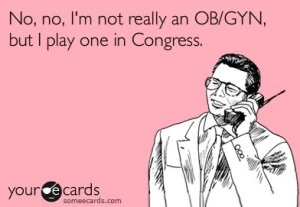In South Dakota, it is now legal to require doctors to tell women seeking abortions that they are putting themselves at risk for suicide.
This move is brilliant from a PR standpoint. Unlike banning certain types of abortions entirely or, say, forcing women to undergo invasive screenings that are medically unnecessary, this seems completely apolitical when you first look at it. Don’t people deserve to be informed if they may be increasing their risk for suicide? Don’t we all agree that suicide is a Bad Thing?
However, something tells me that this is actually another attempt to scare women out of (what should be) a normal, socially acceptable medical procedure.
First of all, the inconvenient truth here is that credible research consistently shows little or no link between abortion and poor mental health. One 2008 study reviewed the literature and found that the only studies that seemed to show such a link had very flawed methodology, whereas the studies that were well-designed showed no links. (Damn liberal academics!) And here’s another study that showed no such links. And here’s a thorough debunking of a study that did claim such links:
Most egregiously, the study, by Priscilla Coleman and colleagues, did not distinguish between mental health outcomes that occurred before abortions and those that occurred afterward, but still claimed to show a causal link between abortion and mental disorders.
In other words, that study actually tried to use mental health pre-abortion to confirm a hypothesis about mental health post-abortion. This is simply not how you do science. And it’s especially bad here, because according to the American Psychological Association, guess what the best predictor of mental health post-abortion is?
Across studies, prior mental health emerged as the strongest predictor of postabortion mental health. Many of these same factors also predict negative psychological reactions to other types of stressful life events, including childbirth, and, hence, are not uniquely predictive of psychological responses following abortion.
That’s right. Shockingly enough, the best predictor of mental health is, well, past mental health. And poor mental health predicts poor response to all sorts of stressful events, of which abortion is only one example. Another one being, for instance, childbirth!
Compounding the bad science here is that, unlike physical side effects,suicide isn’t something that just happens to you suddenly and without warning. People don’t just suddenly wake up one morning and decide to kill themselves. Suicidality is a complex process that involves factors like genetics, family history, environment, social support, mental illness, and life circumstances. For instance, here are some things that, according to research, actually increase one’s statistical risk for suicide:
- diagnosable mental illness
- drug addiction
- poverty and unemployment
- being intelligent
- being male
- being a college student
- being gay, lesbian, bisexual, or trans*
As you can probably surmise, not all of these correlations are also causations. While mental illness and drug addiction can actually cause suicidal behavior, being intelligent and being LGBT probably cannot. In the latter case, the causative culprit seems to be (surprise surprise) institutionalized discrimination and homophobia. Before I get too off-topic, let me point out the irony in the fact that, despite this well-known risk faced by LGBT youth, I don’t see any of these pro-lifers advocating for an end to homophobia.
That’s why something tells me that nothing about this court ruling actually has anything to do with suicide prevention.
Although the court’s ruling does at least acknowledge that abortion probably doesn’t cause suicide, it nevertheless states that “conclusive proof of causation is not required in order for the identification of a medical risk.” This is probably true, but it only makes sense from a physical health standpoint. If studies show that people who get a certain elective medical procedure are much more likely to, say, experience headaches or nausea or numbness, you don’t necessarily need a causative study to conclude that there’s a reasonable chance that these symptoms were caused by the procedure (assuming, of course, that there was no illness present that might be causing them). Furthermore, there’s a difference between saying “This procedure may cause you to experience cramps and headaches” and saying “This procedure may cause you to kill yourself.”
The truth is, mental health doesn’t work that way. A person who gets an abortion might experience mental side effects because of the stress of having gotten pregnant accidentally and been forced to decide what to do, perhaps without the support of a partner or family. Furthermore, any invasive medical procedure can be stressful and worrying for many people–especially one like abortion, which is consistently portrayed as more painful and dangerous than it really is.
And this is all made even more complicated by the fact that the faulty studies in question were actually studying mental health before the abortion. Perhaps a person with poor mental health is more likely to seek an abortion in the first place–say, if they feel that they aren’t mentally capable of raising a child at the moment.
Ultimately, decisions about what to tell a patient should be left up to the people who know most: doctors (with, of course, a reasonable amount of regulation to prevent malpractice). If a doctor can tell that a person seeking an abortion is going through a lot of mental distress, then that doctor may want to gently recommend counseling and perhaps give out some hotline numbers–and training doctors to recognize signs of mental health troubles is always a good thing.
But doctors should not be mandated to fearmonger to their patients. They should especially not be mandated to serve a pro-life agenda.


